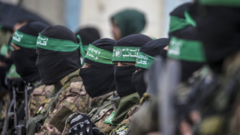Negotiations aimed at securing a ceasefire and the release of hostages between Israel and Hamas encountered a significant impasse last week, with talks failing to achieve a breakthrough. A central point of contention in these discussions and broader future peace efforts remains Hamas’s steadfast refusal to disarm. The group has repeatedly stated it will not lay down its weapons until a fully independent Palestinian state is established.
This position by Hamas underscores a fundamental disagreement that complicates any path towards de-escalation or a lasting resolution in the region. The group views its armed wing as essential to achieving its political goals, particularly the creation of a sovereign Palestinian state with East Jerusalem as its capital and the right of return for refugees. This stance directly contrasts with demands from Israel and many international actors for Hamas’s disarmament and the dismantling of its military capabilities as a prerequisite for any significant peace agreement.
The insistence on linking disarmament to the establishment of a Palestinian state presents a major hurdle for mediators attempting to broker a ceasefire and facilitate humanitarian aid. Without a convergence on these core issues, the prospects for sustained peace talks remain dim. The international community continues to call for de-escalation and the protection of civilians, but the deep-seated disagreements between the primary parties hinder progress on all fronts.



